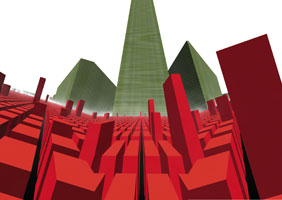| [BACK TO THE ACTUAL EXHIBITIONS/EVENTS] |
|
||
|
||
|
|
Since Thomas More, who created the notion of utopia in the early 16th century, the majority of utopian societies sketched out by various authors imagined cities as the social or territorial pattern of their ideal world. Both the city and utopia respond to different expectations and are defined in different ways. The designs of both has also evolved throughout history. We must ask ourselves then whether the city and utopia aren't simply one of those completely devalued notions that have lost their meaning. Or, on the contrary, are they fundamental principles of modernity (as the history of their development allows us to suppose), adapting to each new era?
A nonplace (literally, according to the etymology of the Greek name), imaginary world, vision of the future in a positive sense, or something that is unrealistic, romantic or totalitarian in a negative one—these may well be simply the main synonyms or connotations of utopia. Modern architecture and design on the one hand and science fiction on the other have given birth to utopian works in the 20th century. It is a world that is resolutely focused on tomorrow, drawing greatly on potential technology and simulating a better life somewhere else, on earth or in space, at a date that is more or less in the offing. If we accept the hypothesis that the 21st century corresponds to other cultural paradigms—whether we are familiar with them or not—what form would utopia take in contemporary society and what would its importance be there? Christian SCHUBARTH Programme: Marc Augé, anthropologist born in 1935, is director of studies at the École des hautes études en sciences sociales in Paris which he presided from 1985 to 1995. After several missions in West Africa, he diversified and opened his observation field to the realities of the contemporary world. Monday 29 november 2004 at 6pm (in english)
Winy Maas was born in Schijndel in 1959. He graduated both as an architect and as an urban planner. Winy Maas has worked as an architect/urban planner at: Bureau Bakker (Bleeker), D.R.O. (Amsterdam), Kuiper Compagnons (Rotterdam), UNESCO (Nairobi), DHV (Amersfoort) and Rem Koolhaas’ Office for Metropolitan Architecture (Rotterdam). Winy Maas regularly gives lectures and workshops at schools and institutions all over the world (e.g. at AA London, Berlage Institute Amsterdam, Universities of Delft, Eindhoven, Berlin, Barcelona, Oslo and Vienna, at the Cooper Union New York and in Los Angeles, Chicago, Boston and Princeton). Beside that, he has been member of the editorial staff of Forum (1994/97) and board member of Items (1995/97) and member of the program board of the National Design Group (1998/). Monday 6 December 2004 at 6pm Sociologist Felix Keller lectures at the University of Zurich. He works at the University of Zurich Institute of Sociology and the Cologne Centre for European Social Research. Felix Keller is the author of various publications on the connections between science and literature and on social representations in popular culture, particularly in science fiction. |
| [BACK TO THE ACTUAL EXHIBITIONS/EVENTS] |

